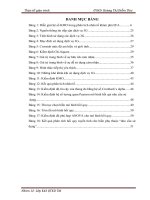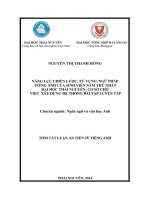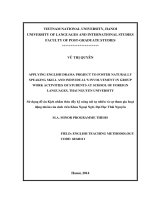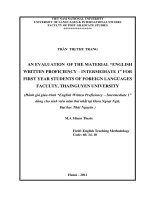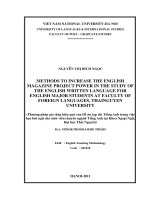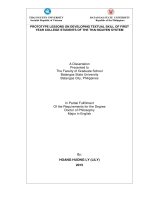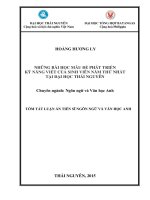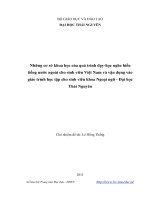Sử dụng đề án kịch nhầm thúc đẩy khả năng nói tự nhiên và sự tham gia hoạt động nhóm của sinh viên khoa ngoại ngữ, đại học Thái Nguyên
Bạn đang xem bản rút gọn của tài liệu. Xem và tải ngay bản đầy đủ của tài liệu tại đây (755.64 KB, 72 trang )
VIETNAM NATIONAL UNIVERSITY, HANOI
UNIVERSITY OF LANGUAGES AND INTERNATIONAL STUDIES
FACULTY OF POST-GRADUATE STUDIES
*********************
VŨ THỊ QUYÊN
APPLYING ENGLISH DRAMA PROJECT TO FOSTER NATURALLY
SPEAKING SKILL AND INDIVIDUAL’S INVOLVEMENT IN GROUP
WORK ACTIVITIES OF STUDENTS AT SCHOOL OF FOREIGN
LANGUAGES, THAI NGUYEN UNIVERSITY
Sử dụng đề án Kịch nhằm thúc đẩy kỹ năng nói tự nhiên và sự tham gia hoạt
động nhóm của sinh viên Khoa Ngoại Ngữ, Đại Học Thái Nguyên
M.A. MINOR PROGRAMME THESIS
FIELD: ENGLISH TEACHING METHODOLOGY
CODE: 60140111
Hanoi, 2014
VIETNAM NATIONAL UNIVERSITY, HANOI
UNIVERSITY OF LANGUAGES AND INTERNATIONAL STUDIES
FACULTY OF POST-GRADUATE STUDIES
*********************
VŨ THỊ QUYÊN
APPLYING ENGLISH DRAMA PROJECT TO FOSTER NATURALLY
SPEAKING SKILL AND INDIVIDUAL’S INVOLVEMENT IN GROUP
WORK ACTIVITIES OF STUDENTS AT SCHOOL OF FOREIGN
LANGUAGES, THAI NGUYEN UNIVERSITY
Sử dụng đề án Kịch nhằm thúc đẩy kỹ năng nói tự nhiên và sự tham gia hoạt
động nhóm của sinh viên Khoa Ngoại Ngữ, Đại Học Thái Nguyên
M.A. MINOR PROGRAMME THESIS
FIELD: ENGLISH TEACHING METHODOLOGY
CODE: 60140111
SUPERVISOR: DƯƠNG ĐỨC MINH, Ph.D.
Hanoi, 2014
i
DECLARATION
This thesis is a presentation of my original research work. Wherever contributions
of others are involved, every effort is made to indicate this clearly, with due reference to
the literature, and acknowledgement of collaborative research and discussions. The work
was done under the guidance of my supervisor, Dr. Duong Duc Minh, at the University of
Languages and International Studies, VNU.
Student‟s name
Vu Thi Quyen
ii
ACKNOWLEDGEMENTS
I would like to give my cordial thanks to Dr. Duong Duc Minh for his kind
guidance that he provided me as my supervisor. I particularly appreciate his helpful
advice, insightful comments and most of all his endless patience.
My thanks also go to all my lecturers from Vietnam National University for their
valuable lectures which help me to orient the research.
I am most thankful to all my colleagues and undergraduate students at Thai Nguyen
School of Foreign Languages for their support in data collection.
Finally my special thanks go to my parents, my husband and my son, for their love
and support throughout this study. Without their encouragement I could not have
completed this thesis.
iii
ABSTRACT
During a long time, implement of English Drama Project in English Language
Teaching classes has been increased all over the world. Many researches have been carried
out to investigate its benefits on students‟ learning English. However, very little empirical
research has been conducted to evaluate advantages that the Project brings to students. The
aims of the study were therefore investigating the ways that English Drama Project impacts
on students‟ natural speaking skill and their contribution to their team work. Two groups of
students were taught speaking by two different methods: one group was taught in a
traditional way and the other was taught with a company of English Drama Project. Two
groups were assessed in the same way after a five-week experiment. Results of the
assessment showed significant differences in the two groups: the group taught with English
Drama Project got better results for the speaking test and better involvement in their
teamwork. It is suggested that English Drama Project should be taught to all students
whose major is English at Thai Nguyen School of Foreign Languages.
Key words: English Drama Project, natural speaking skill, teamwork.
iv
TABLES OF CONTENTS
DECLARATION………………………………………………………………………….I
ACKNOWLEDGEMENTS ii
ABSTRACT iii
TABLES OF CONTENTS iv
LISTS OF ABBREVIATIONS vi
LISTS OF CHARTS AND TABLES vii
PART A: INTRODUCTION 1
1. Rationale for the Study 1
2. Aims of the Study 2
3. Research Questions 2
4. Scope of the Study 2
5. Methods 2
6. Design of the Study 3
PART B: DEVELOPMENT 4
CHAPTER I: LITERATURE REVIEW 4
2.1. Drama Project 4
2.2. Drama Benefits in English Language Teaching 5
2.2.1 Motivation 5
2.2.2 Meaning in Context 6
2.2.3 Psychological Benefits 7
2.3 Drama and Naturally Speaking Skill 8
2.3.1 Naturally Speaking Skill 8
2.3.2 Roles of Drama in Speaking Skill 8
2.4. English Drama Project and Students’ Group Working Ability 11
2.5. Previous Studies in the world and in Vietnam 11
v
CHAPTER II: METHODOLOGY 14
3.1. Participants 14
3.2. Setting of the Study 14
3.3. Data Collection 16
3.3.1. Data collection instruments 16
3.3.2. Data Collection Procedures 18
3.3.3. Data analysis procedure 19
CHAPTER III: FINDINGS AND DISCUSSION 20
4.1. Findings 20
4.1.1. Influence of English Drama Project to Students‟ Speaking Skill 20
4.1.2. English Drama Project and Students‟ Involvement in Group Working . 24
4.1.3. More Findings on the Impacts of English Drama Project 27
4.2. Discussion 28
4.2.1. English Drama Project and Students‟ Speaking 28
4.3. Pedagogical Implication 31
PART C: CONCLUSION 33
5.1 Conclusion 33
5.2 Limitation of the Study 33
5.3 Suggestions for Further Study 34
REFERENCES 35
APPENDIX……………………………………………………………………… I
vi
LISTS OF ABBREVIATIONS
TNSFL: Thai Nguyen School of Foreign Languages
ELT: English Language Teaching
EDP: English Drama Project
EFL: English as a Foreign Language
ESL: English as a Second Language
L1: English as the First Language
vii
LISTS OF CHARTS AND TABLES
Chart 1: Students‟ Scores for Fluency and Coherence
Chart 2: Students‟ Scores for Lexical Resource
Chart 3: Students' Speaking Overall Scores
Chart 4: Students‟ Contributing Positive Ideas in Team Discussions
Chart 5: Students‟ Sharing Positive Ideas and Feedbacks in Team Discussions
Table 1: Students‟ Scores for Grammar Range and Accuracy
Table 2: Students‟ Scores for Pronunciation
Table 3: Students‟ Scores for Non-verbal Language
Table 4: Students‟ Self Assessment on Teamwork Contribution
Table 5: Students‟ Contribution to Their Teamwork from the Observations
Table 6: Students‟ Co-operation through Classroom Observations
Table 7: Students‟ Quality of Work from the Observations
1
PART A: INTRODUCTION
1. Rationale for the Study
In learning a language, speaking is one of the most important language skills since
it is the most common and important means of providing communication among human
beings. The key to successful communication is speaking nicely, efficiently and
articulately, as well as using effective voice projection, speaking is linked to success in
life, as it occupies an important position both individually and socially (Ulas, 2008).
When learners are engaged in group work, they can learn by exchanging
information with other group mates in a socially structured way. Learners will be not only
responsible for their own learning but also able to learn from each other (Olsen & Kagan,
1992, Breen & Littlejohn, 2000). Littlewood also shows that most learners favor “learning
contexts in which they work together with others towards common goals and in which their
success also benefits others” (Littlewood, 2002, p.38).
Many investigations on the advantages and benefits that educational drama
activities bring to students in English Language Teaching (ELT) classes have been
conducted over the world for a few last decades. In 1969, Hoetker stated that drama
increases creativity, orginality, sensitivity, fluency, flexibility, emotional stability,
cooperation and examination of mortal attitudes while developing communication skills
(Hoetker, 1969). Ratliff (2001) indicates that Drama enhances students‟ reading, writing
and listening skills. Davies and Pearse (2002) agree with Hoetker by stating that drama is a
way of encouraging students to improve their communication skills. It can not be denied
that drama brings students chances to improve not only their language skills namely
listening, speaking, reading and writing but also their creativity, sensitivity, flexibility,
emotional stability, cooperation. In other words, drama activities can help students to learn
language well (Bas, 2008).
Even though English Drama Project (EDP) has been applied in EFL classes over
the world for quite a long time, it seems to be pretty new in Vietnam. Thai Nguyen School
of Foreign Languages (TNSFL) is one of the leading institutions in Vietnam who has been
implementing EDP as one of the studying projects in the curriculum and the project is
likely highly interested in by most of students since the Project helps them much in
building speaking skill and group working. However, there is little empirical research on
2
applying EDP in teaching has been conducted to help students‟ speaking skill and team
working increased at Thai Nguyen University.
With all the reasons above, it is necessary to conduct this study to investigate the
ways that EDP impacts on students‟ speaking skill and team working in EFL classes at
TNSFL.
2. Aims of the Study
The study is conducted with two aims:
First, the study aims at investigating how EDP benefits students speaking skill.
Second, the study aims at investigating the way that EDP benefits their contribution
in their teamwork.
3. Research Questions
The research is going to find the answers to the research question “How can EDP
help French-English students at TNSFL foster their speaking skill and team working?”
4. Scope of the Study
As mentioned above, EDP can have students‟ all four language skills and soft skills
improved. However, the main aims of EDP at TNSFL are to provide students with chances
of promoting their speaking skill and group working ability; hence, in this study, the
researcher mainly focuses on students‟ natural speaking skill and their contribution in team
working in the Project. The study is also conducted on second year students majoring at
French-English at TNSFL.
5. Methods
The researcher borrows the experimental method to conduct the study due to the
reason that “the experiment involves control and careful observation and measurement, this
research method provides the most convincing evidence of the effect that one variable has
on another.” The previous researchers also defined the experimental research as “a
scientific investigation in which the researcher manipulates one or more independent
variables, controls any other relevant variables, and observes the effect of the
manipulations on the dependent variable(s). An experimenter deliberately and
systematically introduces change and then observes the consequences of that change” and
“the goal of experimental research is to determine whether a causal relationship exists
between two or more variables. (Ary, Jacobs, Razavieh, & Sorensen, 2009, p.265)
3
Zimney also defines an experiment as “an objective observation of phenomena
which are made to occur in a strictly controlled situation in which one or more factors are
varied and the others are kept constant.” Zimney (1961, p.18). In the current study,
“phenomena” is the changing in students‟ speaking skill and team working. The
“variables” or “varied factor” is applying EDP instead of the traditional way of teaching
speaking while the number of students and their gender are kept constant.
In other words, in this study, EDP is the “independent variable” while speaking and
team working abilities of thirty two second year French-English students are “dependent
variables”. The goal of the study is determining whether EDP can improve the students‟
speaking skill and their teamwork skill.
6. Design of the Study
The study is divided into 3 parts
Part A: Introduction presents rationale, aims, research hypothesis, the scope, the
study method, and the design of the study.
Part B: Development in which literature review with brief and most remarkable
issues on EDP, its values on students‟ speaking and group working are presented. The
chapter also performs details in methodology, findings and discussion.
Part C: Conclusion gives a brief review of the whole study and some limitations
of the study and suggestions for further study.
4
PART B: DEVELOPMENT
CHAPTER I: LITERATURE REVIEW
This chapter is going to present definition of EDP and EDP at TNSFL, its values in
EFL classes, its influence on speaking skill and team working.
2.1. Drama Project
Drama is defined by many different authors in many ways. Holden defines drama
as "any kind of activity where learners are asked either to portray themselves or to portray
someone else in an imaginary situation". In other words, drama is concerned with the
world of "let's pretend"; it asks the learner to project himself imaginatively into another
situation, outside the classroom, or into the skin and person of another person" (Holden,
1982, p.14). Merriam-Webster also shares the same idea with Holden in defining drama as
a composition in verse or prose intended to portray life or character or to tell a story
usually involving conflicts and emotions through action and dialogue and typically
designed for theatrical performance.
Drama defined by Bolton and Neelands as an activity in which teacher and students
invent and enact dramatic situations for themselves rather than for an outside audience.
This activity, perhaps most widely known as drama education, has also been called
classroom drama (Bolton, 1992, 1998, 2007; Neelands, 2008).
By definition, a drama is a story enacted on stage for a live audience,
Wessels distinguishes drama from theatre as “drama in education uses the same tools
employed by actors in the theatre. But while in the theatre, everything is contrived for the
benefit of the audience, in classroom drama, everything is contrived for the benefit of the
learners.” (Wessels, 1987, p.8). The distinction between drama and theatre is also made by
Dervishaj when he states that in the classroom, drama is often referred to creative
dramatics and focuses on the process of dramatic enactment for the sake of the learner,
while theatre arts mainly focus on entertaining and relaxing audience. In classroom drama,
students do not learn about drama, but they learn through drama combs” (Dervishaj, 2009).
It can be inferred from all above that theater is performed on stages in cinema and
theaters and it functions as a means of entertainment, however, drama in language
classroom is often found to promote students‟ learning. No mater how drama is defined,
drama is a helpful and educational activity in which students play the roles of actors or
5
actresses to portray dramatic characters under the teachers‟ guide. Moreover, besides
taking roles of actors and actresses, students are also required to do many other works of
playwrights, editors and directors in EDP. In other words, they are ordered to do many
things including writing the scenarios, editing them and rehearsing as well as performing
the play in groups. These tasks result them in improving all their language skills and group
working ability.
Regarding types of drama, Dervishaj states some kinds of educational drama
namely mining, role play (which includes dramatic plays, story dramatization and socio-
drama, seminar style presentation, debates and interview), simulation and improvisation
(Dervishaj, 2009). Basing on the classification, EDP at TNSFL may be classified either
dramatic plays or story dramatization since students are allowed either to write plays based
on available stories or create their own stories.
At TNSFL, EDP which accounts for two credits, is a dependent subject and is
taught for students majoring at English Language or English Education. In the Project,
students work in groups of four or five and they are responsible for writing a play,
practicing it and performing it at the end of the term. In EDP, students are required to
reveal all their four language skills, yet their speaking skill and team working ability are
mainly focused on.
2.2. Drama Benefits in English Language Teaching
Recently, educators have started to explore the use of drama as an integrated
way of learning the curriculum. According to Fleming, “drama is a learner-centered
approach” (Fleming, 2006, pp.54-64), so it allows learners to become active
participants in the learning and teaching process. It should be emphasized that “drama is
a communicative language-learning technique because it is student-centered and meaning-
based and it is “fun but not unstructured” (Sarah, 2000, p.133). It can not be denied that
there are many researches showing the values of EDP in ELT. Below, the present
researcher is going to show some of the most remarkable benefits of EDP in EFL classes.
2.2.1 Motivation
EDP is said to inspirit students to learn English. Good motivation is one of the
necessary factors for efficient learning. Harmer defines motivation as “some kind of
internal drive which pushes someone to do things in order to achieve something.” (Harmer,
6
2001, p.51). In 2007, he also emphasized that “Drama gives students the chance to learn by
doing because EDP‟s stage is a place “where students are involved in experimentation in
order to arrive at knowledge” (Harmer, 2007, p.20).
In a study in 1990, Gaudart asserts that drama techniques help teachers to organize
the class well and to engage all the students more actively in the English learning process
(Gaudart, 1990, p.235). In 2008, Schiller (2008) also claimed that drama games or drama
activities could encourage some at-risk students who were at low level to communicate
with others and express themselves bravely.
The use of drama undoubtedly represents one of the methods of work used by
teachers to provoke intrinsic motivation. Not only does it help to build a good teacher-
student relationship, but it also actively engages all the students at all the time, therefore
“in a sense, motivation is not needed when working through drama, because the enjoyment
comes from imaginative personal involvement.” The researchers further explain that
“drama activities also help students to get rid of the diffidence and boredom that come
from being forced to stay passive most of the time”. (Maley & Duff, 2005, p.13).
EDP can provide students with internal motivation which helps them to increase
their love for English and it also makes their studying results improved even they are at
risk level.
2.2.2 Meaning in Context
Drama brings students into real contexts; as a result, they can acquire the language
faster in an active way. Desiatova indicates that drama is an ideal way to encourage
learners to guess the meaning of unknown language in a context. Learners will need to use
a mixture of language structures and functions if they want to communicate successfully
(Desiatova, 2009).
Harmer (2007) also claims “meaning of language depends on where it occurs
within a larger stretch of discourse, and thus the relationship that the different language
elements have with what comes before and after them. In other words, speakers and writers
have to be able to operate with more than just words and grammar; they have to be able to
string utterances together” (Harmer, 2007, p.59). He also emphasizes his statement by
claiming that drama represents an ideal method of work if teachers want to put the
meaning for students into a sizeable context. Unlike in guided practice, students are
7
involved in real communication while they “activate language to communicate real
meaning, rather than just practicing language” (Harmer, 2007, p.270). Wheeler also
suggests that drama is an effective tool to help teachers create more experiential learning
tasks and offer “purposeful and contextualized activities” (Wheeler, 2001, p.24).
To sum up, context is very important in communication. Utterances may have no
meaning without context and context is created in EDP, as a result, it may be concluded
that EDP is one of channels that make speakers‟ utterances understandable and
meaningful.
2.2.3 Psychological Benefits
Drama can help students to overcome the psychological barrier from speaking in a
foreign language because it is a kind of stress-free, fun teaching that encourages pupils to
participate without embarrassment” (Hamilton & McLeod, 1993, p.4).
Hamilton and McLeod describe drama as a process of social learning by
getting student to be involved in relations with others, it promotes social and adaptive
skills in the process of learning a foreign language. Learners are encouraged to explore
themselves and their reactions in relation to the outside world in a way which can be both
strengthening and enriching. (Hamilton and McLeod, 1993, p.5)
Additionally, Sam (1990) indicates that drama activities can be used to provide
opportunities for the students to be involved actively. Davies (1990) agrees that when
students dramatize, they use all the channels (sight, hearing, and physical bodies) and each
student will draw to the one that suits them best. In other words, students will all be
actively involved in the activity and the language will "enter" through the channel most
appropriate for them. Via, Stern, Kao & O'Neill (1998) agree with Davies by stating that
drama increases in students‟ self-esteem, self-confidence because “by taking a role,
students can escape from their everyday identity and "hide behind" another character.
When students are given special roles, they are encouraged to abandon their shyness”.
Davies (1990) also shows other psychological and social benefits including developing
problem-solving skills, working well in groups, and taking more risks.
Generally speaking, the most important aim of education drama is the overall
development of a personal and social aspect of learner‟s personality. Drama stimulates
creativity, imagination and also critical thinking as students are often asked to find
8
solutions to diverse problems. It also improves students‟ self-esteem and self-confidence
because they are capable of performing in front of the audience, although the audiences are
their classmates. Moreover, education drama forms students‟ learning autonomy.
2.3 Drama and Naturally Speaking Skill
2.3.1 Naturally Speaking Skill
In the last century, naturally speaking was believed to be “accompanied by greater
overt motor activity that occurs in several non-speaking activities. The increase is
especially marked for gestures (Kimura, 1973, p.43). Whitear (1998) also states that
speaking is not only about words, structure and pronunciation, but also feelings.
Nunan suggests that in language lessons-especially at the beginning and
intermediate levels – learners must be given opportunities to develop both their fluency and
accuracy. He also defines the terms “accuracy” and “fluency” in speaking skill. Accuracy
is the extent to which students‟ speech matches what people actually say when they use the
target language. Fluency is the extent to which speakers use the language quickly and
confidently, with few hesitations or unnatural pauses, false starts, word researches, etc
(Nunan, 2003, p.55).
In 2009, the definition of naturally speaking was defined again by Heidegger as
“Natural speaking means speaking as it always takes place initially and for the most part,
and where other mode of speaking with the world is at hand, namely the scientific mode”
(Heidegger, 2009, p.18).
From these definitions of speaking, a definition of naturally speaking should be
made for this research only. Although speaking naturally does not necessarily mean
speaking like a native speaker, naturally speaking should be accompanied with accuracy,
fluency and feelings (or emotion) with the help of non-verbal expression. In other words,
naturally speaking is the ability of making quick, accurate and confident verbal reaction in
a certain context with good non-verbal language.
2.3.2 Roles of Drama in Speaking Skill
Smith noted that although drama has existed as a potential language teaching tool
for hundreds of years, its applicability as a language learning technique to improve oral
skills has come to the forefront (Smith, 1984, p.51). Bas (2008) claimed that drama
activities can help students to communicate well. It offers great opportunities for them to
9
communicate with others even when they have limited vocabulary. Phillips encourages
teachers using drama in second language teaching because “it encourages children to speak
and gives them the chance to communicate, even with limited language, using non-verbal
communication, such as body movements and facial expressions” (Phillips, 2003, p.6). In
short, drama can help students improve their both verbal and nonverbal communication.
Benefits that drama brings to students are presented in detail below.
It is believed that drama motivates students to speak. Maley & Duff shows the
reasons why learners are not willing to speak “the problem of not wanting to speak or,
more often, not knowing what to say is practically resolved because the activity
makes it necessary to talk” (Maley & Duff, 2005, pp.13-14). Students with low proficiency
and low confidence can be benefited from drama, just like “good” students. Hamilton &
McLeod also state that drama provides students with a broad range of opportunities in
learning English and drama motivates them to learn speaking English and gives them more
confidence to speak English (Hamilton & McLeod, 1993, p.23). Drama can also bring
motivation to less confident students to speak up before the class “even some students who
do not have confidence to speak up in public are willing to join in the drama activities.
They have a lot of fun and become creative and often able to speak naturally.” (Guida,
1995, p.33). Before Guida, Pietro (1987) says that students who are not naturally talkative
often appear more willing to join in the discourse in drama activity when they realize that
they are not dominated by a teacher. Additionally, Desiatova (2009) discusses “drama
gives learners an experience of using the language for genuine communication and real
life purposes; and by generating a need to speak. In short, drama provides students
need and good chances to speak. It is drama that pushes students to speak even they are not
confident or not naturally talkative.
Drama helps students‟ speaking more emotional and fluent. Gomez finds that steps
by steps, drama can help students enhance their speaking skill more emotional, accurate
and fluent by learning syntax and fundamentals then sounds and idioms (Gomez, 2010,
p.30). Whitear (1998) believed that speaking is not only about words, structure and
pronunciation, but also feelings, motivations and meanings that are valuable benefits for
bringing drama to the language learner. Moreover, it is known that one of the requirements
of naturally speaking is emotion which is expressed by gestures, facial expressions which
10
really matches with Wagner‟s idea when he indicates that drama requires students to
produce appropriate words emotionally by using gestures and facial expressions. Students
can be free to act and create the character that they want to be (Wagner, 2002).
Furthermore, drama activities can provide students with an opportunity to use language to
express various emotions. Drama activities are also useful in the development of oral
communication skills, and reading and writing as well. These ideas also were discussed by
Barbu (2007) when he claims that using drama to teach English results in real
communication, involving ideas, emotions, feelings, appropriateness and adaptability.
Verriour says “as pedagogical process, drama can provide the means for connection
student‟s emotions and cognition” (Verriour, 1985, p.150). O‟Gara (2008) also shares the
same ideas with Verriour by stating that drama motivates students to be involved in the
language class emotionally and cognitively. Moreover, Vernon also supports the view that
this conversational use of language also promotes fluency. He states that while learning a
play, students are encouraged to listen to, potentially read and then repeat their lines over a
period of time. By repeating the words and phrases they become familiar with them and are
able to say them with increasing fluency by encouraging self-expression, drama motivates
students to use language confidently and creatively. (Vernon, 2009, p.2)
Drama is a good methodology to increase students‟ pronunciation. Goodwin (2001)
states that drama is a particularly effective tool for pronunciation teaching because various
components of communicative competence (discourse, intonation, pragmatic awareness,
non-verbal communication) can be practiced in an integrated way. Gomez (2010) showed
that drama activity combines action and entertainment for students while achieving the
teaching goals. Students don‟t only have fun but also learn a variety of components from
acting the story, like how to make an English accent or imitate voices and intonations. Mok
believes that drama, which “integrates language use in a meaningful way”, can give
“students the opportunity to use the language to perform tasks and to integrate their
knowledge of form and function, as well as their ability to express themselves using
appropriate stress, intonation and pronunciation”. (Mok, 2001, p.26)
In summary, Drama brings many benefits to speaking skill. Students are motivated
to speak and provided chances of promoting their speaking accuracy, fluency,
pronunciation (including intonation, stress) and emotion through Drama.
11
2.4. English Drama Project and Students’ Group Working Ability
Larson and LaFasto (1989) define a team as a unit of two or more people who
interact and co-ordinate their work to accomplish a specific goal. Northouse defines team
as “organizational groups composed of members who are independent, who share common
goals, and who must co-ordinate their activities to accomplish these goals” (Northouse,
2001, p.161).
Individuals‟ team working ability is also taken concern in EDP besides speaking
skill. However, there has been a little empirical research that investigates the impacts of
EDP on students‟ involvement in their team working. Sam (1990) indicates that group
work is an effective form in drama activities, which takes every student‟s initiative to
process the learning. Students who have strong linguistic aptitude can take important roles
while the low level students also can be engaged in by taking the subsidiary role. He
concluded that group work is encouraged by drama activity. Davies & Pearse (2002) also
admit that drama can increase the individual practice and develop students‟ autonomy
because they will become more engaged in communication and interaction through group
work. O‟Gara (2008) shares his agreement with the two researchers by stating that drama
is essential for students to work together and interact with others. It offers a good
opportunity to carry out task-based learning.
In short, although researches on drama‟s influence on students‟ ability of working
in team are limited, all authours share same ideas by indicatinting that drama encourages
students to develop their creativity, strengthen their confidences, as well as improve the
ability to cooperate with others.
2.5. Previous Studies in the world and in Vietnam
The early, Heathcote (collected writings, 1984) and Bolton (collected writings, 1984)
encouraged teachers to integrate the theatre into L1 classroom. Bolton, in particular,
championed the use of drama in classes for all subjects, making it "the centre of the
curriculum”. These ideas soon transferred to ESL practitioners and gained many proponents.
As early as 1973, in fact, Hines commented that drama, and especially role play,
has long been recognized as a valuable and valid means of mastering a language. Pioneers
in the field of ESL/EFL include Via (1976), Maley & Duff (1982), and Smith (1984), who
all published books based on their experiences as language teachers who have used drama
12
in their classrooms. In these books, both theory and practice are performed. Via's students
have acted in plays during his whole career as an ESL teacher. Smith speaks to practicing
teachers and develops an analogy between L1 actors and ESL students as well as provides
many communicative theatrical activities. Maley & Duff also collect myriad activities and
offer advice on how to use them. These authors are followed by more and more others who
also encourage the use of drama in the language classroom. Wessels' Drama (1987) is a
very practical book that provides rationale for using drama as well as a number of
activities. She also offers suggestions of how a class might go about staging a play in the
target language and describes one such experience that she had with a class. Porter
Ladousse (1987) published a similarly useful book, hers devoted to role plays, with
justification and many examples. Some professional books also discuss the theories behind
theatre techniques and language learning. Half of the volume edited by Byram and Fleming
(1998) is devoted to describing how teachers have used drama to promote cultural
understanding and awareness among their students. In a different vein, Kao & O'Neill
(1998) explain the technique and the merits of process drama, an extended role play
activity that uses integrated skills to involve the whole class. Brauer has edited a volume
about the connections among language, writing, and drama. Books with practical drama
activities for teachers continue to emerge as well. Another book by Hess - All the World's
a Stage will offer more suggestions of activities. Other general books for teachers also
include suggestions for theatrical activities, like Woodward's Fun With Grammar (1996),
written to accompany the Azar ESL/EFL grammar books.
In recent years, drama also has been encouraged to be used in ELT classes by many
researchers namely Wheeler (2001), Wagner (2002), Sun, (2003), Littlewood (2002),
Maley and Duff (2005), Harmer (2007), Ulas (2008), Dervishaj (2009), Desiatova (2009),
and Gomez (2010). All of them use drama technique in their language classroom and in
their scientific products, they admit the benefits that drama beings to students and they also
guide readers the way to apply drama in teaching and learning English.
Despite of the booming of education drama activities in ELT classes over the
world, in Vietnam EDP seems to be quite unpopular since it is highly likely that there are
not so many researches on applying Drama Project for EFL classes. The researcher could
find only one master thesis named “Using a drama project to give students opportunities to
13
be communicative” by Vũ Thị Thanh Nhã from College of Social and Humanities- VNU in
2005. In the research paper, she made an experiment to investigate the way that students
are encourage to orally communicate. The result shows that EDP can motivate students to
speak before the public.
In summary, EDP has been used as a teaching methodology in ELT classes by
many teachers over the world. Drama is also admitted to be able to motivate students‟ to
speak naturally with accuracy, fluency and good gestures. Moreover, EDP also provides
students with chances to sharpening their ability of working with other people in teams.
14
CHAPTER II: METHODOLOGY
3.1. Participants
The participants of the study were thirty-two second year students who are studying
both French and English at TNSFL as their majors. They were selected due to two reasons.
First, EDP has been applied for students of English Education and English Language while
French-English, Russian-English and Chinese-English students always desire to embody
the Project. Second, although both French and English are Latin language and they may
have a lot of similarities, their pronunciations are much different. However, when studying
English, students of French and English classes may get many difficulties in speaking
English while EDP is expected to help students‟ speaking skill more advanced.
Accidently, all participants of the study are females between 18 to 20 years old and
they have just finished their first year at TNSFL. As the number of second-year students in
the French-English class is limited, all of them were invited to the research. They were
assigned randomly into group A as the control group and Group B as the experimental
group with 16 participants in each group. Furthermore, in this research, there was a
homogeny of gender because all subjects shared the same gender.
3.2. Setting of the Study
The study was conducted at TNSFL in the summer holiday 2014 in five weeks
from 23
rd
Jun to 2
nd
August with nine meetings. (Appendix 1)
In the first meeting on Monday 23
rd
Jun 2014, all students were invited to
the room A201 at TNSFL and they were randomly selected into Group A and B. After that,
Groups A and B were also randomly divided into eight smaller groups numbered from 1 to
4 in Group A and from 5 to 8 in Group B. Due to the subdivision, in the following parts,
the researcher would like to replace the term “small group” by “team” to avoid confusion
with Group A and Group B. In other words, Group A consisted of teams 1, 2, 3 and 4
while the teams 5, 6, 7, and 8 belonged to Group B. When this step was accomplished, the
students in Group A were allowed to go home. Group B were informed the Project, after
that they were as asked to read stories or novels at home to select the one they were most
interested in and to write a draft for the first scene of the play after they had been guided
the way to write a drama scene. In the meeting, the researcher also informed them the way
to work together. Because of the time limitation in the meetings, the researcher did not
15
have time to check their writing at class, as a result, after each meeting, the teams had to
accomplish the assigned work before the next meeting and they were required to email the
researcher their work before the following meeting. The researcher checked their scenario
and gave the teams comments and guided them to do next steps in the homework checking
section which usually lasted for about 30 minutes at the beginning of each meeting. In turn,
they did not have homework as Group A. In other words, students in Group A were
required to practice speaking with some IELTS speaking tests as homework. In the
homework checking section, the students in Group A were called out to perform the
homework while Group B were guided to do the next parts of the Project.
In the experiment, the book “Direct to IELTS” by Sam Mc Carter was
implemented as the textbook for the both groups because of two main reasons. Firstly,
according to the National Foreign Language Project 2020, students graduating from
University should have reached C1, and IELTS seems to be very common to students at
TNSFL. Secondly, in the second year, students at TNSFL are taught IELTS strategies for
listening in listening lessons. Hence, teaching them with IELTS speaking does not bring
challenges to them, yet does bring them good preparation for C1 target before their
graduation.
It should be made clear that meetings with Group A and Group B happened
separately in the same room and same days but different time. The meetings were hold in
room A201 at TNSFL on Mondays, Thursdays and Fridays; however, the lessons for
Group A began at 7:30 am and finished at 9:00 am while those for Group B lasted from
9:30 am to 11:00 am. The experiment lasted for three weeks and was divided into two
stages. The first stage consisted of four meetings in which Groups shared the same
contents in each lesson but different homework. In the second stage, the four other
meetings were held and there were some small differences in contents and homework
between the two groups. The posttest taken on the 2
nd
August 2014 marked the end of the
experiment.
16
3.3. Data Collection
3.3.1. Data collection instruments
The researcher used the post-test to measure changes in the students‟ speaking skill.
Additionally, a self-peer assessment form and sixteen observations were utilized to
investigate their involvement in group work.
3.3.1.1 Post-test
Campbell & Stanley (1963, pp.171-246) gives two advantages of pre-test and post-
test. First, it provides tight scientific control over threats to internal validity, thus allowing
it to be classified as a "true experimental design." Second, it is a versatile design. While it
is often used to compare just two groups (an experimental and a control group), it can
easily be extended to accommodate additional comparison groups.
In the study, the students had just taken the final test for the first year; and there
was no big gap in their scores. Additionally, the students were randomly selected into the
control group and experimental one. All the above reasons resulted in no pre-test in the
study. There was only post-test implemented in order to measure changes in students‟
speaking ability after the experiment. It is believed that the students‟ speaking skill may be
affected by many other factors; it is not only affected by one or two factors. However,
because the study lasted in only 5 weeks, the post-test seemed to be the most suitable in the
situation. Since the participants were taught IELTS speaking, the researcher borrowed the
IELTS speaking tests to evaluate their speaking. The students‟ speaking ability was
assessed by two visiting teachers at TNSFL who come from the Unites States. One of them
was the examiner and the other played role as the proctor. In the test, each student had at
most ten minutes to show their speaking ability. In the first part, students answered some
questions related to their free times, their hobbies, their studying, their family, festivals,
sports, etc. In the second part, they were offered one card on which there was one topic and
they spent one minute preparing the topic and showed their opinion in two minutes. Before
finishing their test, in the third part, they had about 3 minutes to state their ideas on some
extra questions. As regard the topics and cards in the two tests, totally there were eight
speaking test questions taken from an IELTS book by Guy (Guy, 2008, pp.118-121).
Consequently, to keep the cards in secret, students were not allowed to leave the exam

